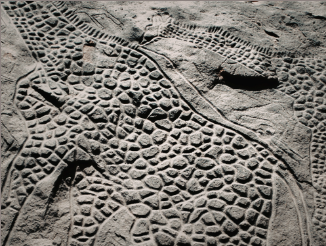But there’s something else I want to suggest here, and it’s to stop thinking about time entirely. Or, at least, to stop thinking about time as something consistent. We all know that time can be stretchy or compressed—we’ve experienced hours that plodded along interminably and those that whisked by in a few breaths. We’ve had days in which we got so much done we surprised ourselves and days where we got into a staring contest with the to-do list and the to-do list didn’t blink. And we’ve also had days that left us puddled on the floor and days that left us pumped up, practically leaping out of our chairs. What differentiates these experiences isn’t the number of hours in the day but the energy we get from the work. Energy makes time.
Here’s a concrete example, and perhaps a familiar one: someone is so busy with work and caretaking that they don’t make time for their art. At the end of the day they’re too tired to write or paint or make music or whathaveyou. So they don’t. Days, then weeks go by. They are more and more tired. They are getting less and less done. They take a mental health day and catch up on sleep but the exhaustion persists. Their overwhelm grows larger, becomes intolerable. The usual tactics don’t work.
Then one day they say fuck it all. They eat leftover pasta over the sink, drop mom off at her mahjongg game, and go sit in the park to draw. They draw for hours, until the sun goes down and they’re squinting under the street lights. And, lo and behold, the next day they plow through all those lingering to-dos. They see clearly that half of them were unnecessary when before they all seemed critical. They recognize a few others as things better handed off to their peers. They suddenly find time for attending to that one project they’d been procrastinating on for weeks. They sleep better. Their skin looks great. (Okay I might be exaggerating on that last one, but only mildly.)
It turns out, not doing their art was costing them time, was draining it away, little by little, like a slow but steady leak. They had assumed, wrongly, that there wasn’t enough time in the day to do their art, because they assumed (because we’re conditioned to assume) that every thing we do costs time. But that math doesn’t take energy into account, doesn’t grok that doing things that energize you gives you time back. By doing their art, a whole lot of time suddenly returned. Their art didn’t need more time; their time needed their art.
I’m using art here, because in my experience, most people have something shaped like that in their lives—some thing that when neglected siphons time and energy away but when attended to delivers it in droves. But you can substitute art for whatever activity or habit leaves you more energized, gives you that time back: puzzle night with your BFFs, organizing your colleagues, working a shift at the community garden, baking cookies for the block party, going to the woods, touching grass and all that.
The question to ask with all those things isn’t, “how do I make time for this?” The answer to that question always disappoints, because that view of time has it forever speeding away from you. The better question is, how does doing what I need make time for everything else?
-- from an essay by Mandy Brown














